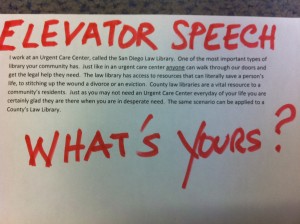 The next time someone asks you what you do what will you say?
The next time someone asks you what you do what will you say?
“I’m a lawyer”?
That doesn’t say very much, does it? It’s a good way to clear the room, however.
“I’m a PI lawyer”?
I used to say that but too many people wondered if I was a lawyer or a private investigator.
“I’m a personal injury lawyer”?
Getting better, but many people still don’t know what that means or how you can help them.
If you’ve ever found yourself searching for the right way to answer this question, help is on the way. All you need to do is follow these three steps:
- “You know how. . .?” Orient the listener to the problems you solve.
- “I help. . .”. Tell them what you do.
- “I’m a. . .”. State your practice area.
Examples:
- Estate planning: “You know how people want to protect their kids and their spouse in case something happens to them? Well, I take care of everything for them so they never have to worry about that again. I’m an estate planning lawyer.”
- Personal injury: “You know how people get injured in a car accident or on someone else’s property and want to collect money from the other party or their insurance? I make sure they get their bills paid and don’t get taken advantage of so they can get well and get back to work. I’m a personal injury lawyer.”
- Small business lawyer: “You know how business owners need to protect their businesses and make better decisions? I help them do that with advice and legal documents. I’m a business lawyer.”
- Family law: “You know how when people get divorced they want to protect their kids and get a fair property settlement? I take care of that for them so they get what they deserve and can sleep better at night. I’m a family law attorney.”
You can also add a few words about “what else” you do: “I’m a business lawyer. . . I also help business owners collect money that’s owed to them and defend them when anyone sues or tries to make a claim against their company.”
You get the idea.
Answering this way gives the listener a context so they can better understand what you do and how you can help them, or someone they know. It may still clear the room, however.







